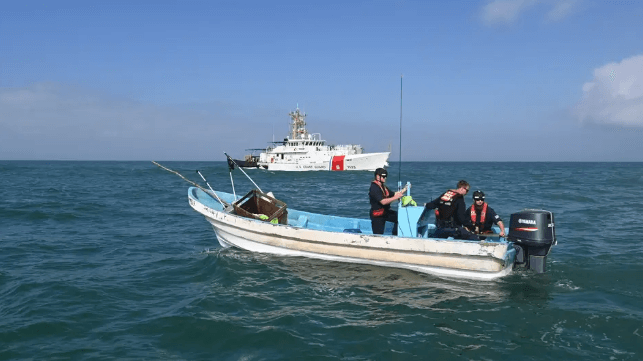U.S. Sanctions Mexico's Gulf Cartel for Illegal Fishing off Texas

Last week, the U.S. Treasury imposed sanctions on five Mexican cartel members who help run a large-scale illegal fishing and trafficking operation in the U.S. Gulf of Mexico.
U.S. Coast Guard boat crews based in Texas spend considerable effort catching Mexican high-speed fishing boats (lanchas) in U.S. waters. In FY2021, coastguardsmen seized 78 lanchas and 15,000 pounds of fish - mainly red snapper, the primary target species for Mexican illegal fishing operators. The fishermen are attracted by the comparatively healthy fishery in the U.S. exclusive economic zone, but when they encounter the Coast Guard, their boats and catch get confiscated.
The Treasury says that these fishermen are backed by the Gulf Cartel, one of Mexico’s most dangerous criminal organizations. The Gulf Cartel operates primarily in Mexico's Tamaulipas State, Mexico, and makes money moving drugs and migrants into the United States.
According to the Treasury, the cartel also runs a fishing camp for lancha fishermen out of Playa Bagdad, just south of the Texas border. The fishing crews bring their illicit catch back to the camp, where it is resold and (often) exported back into the United States under a false label.
This is a multimillion-dollar activity for the cartel, and it underpins other revenue opportunities. In addition to the illegal fishing operation, the cartel uses the same lanchas for human smuggling and narcotics trafficking in the Gulf of Mexico.
Treasury has identified two Mexican nationals - Raul Decuir Garcia and Ildelfonso Carrillo Sapien - as the owners of the lancha camp. In addition, the agency named Ismael Guerra Salinas and his brother Omar Guerra Salinas as the Gulf Cartel members with territorial responsibility for Playa Bagdad. They allegedly oversee the illegal fishing operation, along with drug trafficking and human smuggling.
The agency also named Francisco Javier Sierra Angulo as the current chief of the Gulf Cartel in Matamoros, Tamaulipas.

that matters most
Get the latest maritime news delivered to your inbox daily.
"[This] action highlights how transnational criminal organizations like the Gulf Cartel rely on a variety of illicit schemes like IUU fishing to fund their operations," said Acting Under Secretary for Terrorism and Financial Intelligence Bradley T. Smith.
The U.S. Coast Guard, Homeland Security Investigations, the Drug Enforcement Administration and the Mexican financial intelligence agency UIF all contributed to the sanctions designations.
